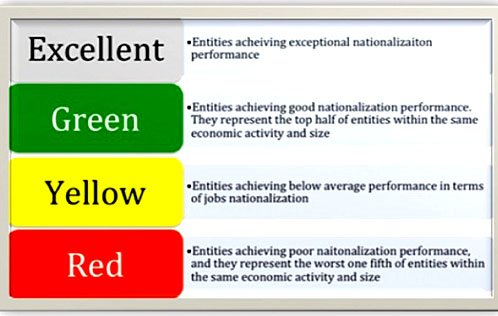 Problem Solved
Problem Solved
The problem of unemployment of the Kingdom of Saudi Arabia has been addressed well by the Ministry of Labor. The result is quite obvious for nowadays, there is an increasing number of Saudis who get hired. The issue on the unqualified locals is also taking into account.
Thus, the Minister of Labor Adel Fakieh is not worried about this concern because for him, qualification must not come first; they must be hired instead and be trained by the experienced workers and eventually become qualified ones. His statement is really good for there are no more problems with the implementation of the Nitaqat. The solution for Saudis’ unemployment therefore, is the Nitaqat.
Other Options
However, there can be more solutions to address the problems of unemployment in Saudi. Nitaqat can be just one of many ways to combat unemployment.
First, The Saudi government can take much closer look on the problem. It is easier right now for the Kingdom for they already knew that there is a problem. Unemployment! Next, who are the unemployed?
Majority of the unemployed Saudis are young lads who are high school graduates. They do not have Vocational Diploma or Bachelor’s Degree.
Knowing these things, the Kingdom can draft another possible solution to address the issue on unemployment. Here are the questions and answers format for clear understanding.
-
What is the problem? Unemployment.
-
Who are the unemployed? Young Saudis who do not have Vocational or Bachelor’s Degree.
-
How to solve the problem? Implement Nitaqat so that Saudis will be given a chance to work.
-
But they are not qualified how it is possible? Just hire them and be trained to do the job.
The first question is answered. The second question is also solved. In the third question, there can be better answer. Send them to schools and attain knowledge that is professionally aligned to the job that they would be landed to in the future.
Schools are the best places for training, and not the companies where people are already working. The products of schools are trained individuals who are ready to be deployed to the labor market. Again there is no shortcut for this.
Here, another issue will arise. Most probably, there are young Saudis who are too lazy to study. They will rather stay home and sleep than attending the school classes. But still there is a solution for this. The Kingdom of the Saudi Arabia is the most strict and most disciplined country in the whole world.
They can send the young uneducated Saudis to school and learn. Make it mandatory so that they have no choice but to study. Eventually they can contribute much for the Kingdom in the future.
Therefore, the answer regarding lack of qualifications is of course education. Why there is unemployment in Saudi Arabia? It is because they are uneducated and therefore unqualified to fill the jobs in the labor market.
In the last question, there is much better response to address the issue. Why, because hiring the unqualified Saudis first, will not guarantee that they will learn and perform the job in the future. In some cases, it can be possible. But putting the unknowledgeable Saudis in the working environment can create a big problem with the companies.
Why is it so? It is because company is a company. It is the working area wherein there are employees who are working and eventually their works will bring profit to the company. Company is not like a training school wherein the students must attend the class and learn the lessons in a particular subject matter. It’s not the right place wherein the unqualified locals must be there to work and learn.
The formula must not be work then learn. It must rather be; learn, and then work followed by gaining more knowledge. It is only then that the issue would be fully settled.
In some cases, those Saudis who have potentials for the job can be hired through another training program. That is the On Job Training (OJT) which can be offered by the companies.
Here, the job seekers will be attending the working hours like regular employees. This is to be considered as their actual training. After spending enough time of training, the manager or the immediate superior will evaluate their performance.
When the companies find out that they are qualified upon evaluation, they can hire the trainees as regular employees. If they do not pass the evaluation, the companies can issue a certification saying that this particular person has attended training in the company.
The trainees now can use the certificates of training in looking for a job. This time the trainees are already qualified and at the same time experienced. Henceforth, the issue of lacking of qualifications, experiences, and education has been resolved.
While implementing Nitaqat, The Kingdom of Saudi Arabia can also take into consideration all of these things.






 One of major responsibilities of a country is to provide jobs for its citizens. In this sense, the Saudi government implemented the Nitaqat (Saudization) program.
One of major responsibilities of a country is to provide jobs for its citizens. In this sense, the Saudi government implemented the Nitaqat (Saudization) program.
 Nitaqat is a government program of the Kingdom of Saudi Arabia, purposely implemented by the Ministry of Labor in order to enhance the labor force of the Saudi Nationals. At the advent of its announcement, foreign workers were not bothered too much.
Nitaqat is a government program of the Kingdom of Saudi Arabia, purposely implemented by the Ministry of Labor in order to enhance the labor force of the Saudi Nationals. At the advent of its announcement, foreign workers were not bothered too much.
